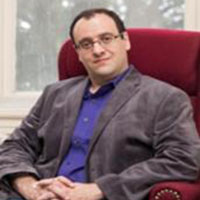
Professor of Philosophy
lupherta@jmu.edu
Contact Info
Office: Cleveland 212
Fax: (540) 568-8072
Education:
B.A. Philosophy University of Texas at Austin
B.S. Physics University of Texas at Austin
B.S. Mathematics University of Texas at Austin
M.A. History and Philosophy of Science University of Pittsburgh
M.A. Philosophy University of Texas at Austin
Ph.D. Philosophy University of Texas at Austin
Research:
Professor Lupher is the co-founder and co-director of the Logic and Reasoning Institute. His work focuses on the philosophy of physics along with related issues in the philosophy of science and metaphysics. He is also interested in logic, the philosophy of language, and analytical philosophy. He has published articles on the philosophy and history of quantum field theory, causation, and the implications of different logical frameworks. Professor Lupher was the winner of the Clifton Memorial Prize for 2008 in the Philosophy of Physics.
Teaching:
Professor Lupher's courses include Introduction to Philosophy (PHIL 101), Critical Thinking (PHIL 120), Introduction to Symbolic Logic (PHIL 250), Philosophy and Scientific Inquiry (PHIL 395), Philosophy of Physics (PHIL 396), Philosophy of Space and Time (PHIL 397), Philosophy of Quantum Theory (PHIL 398), and various advanced logic courses.
Selected Publications:
Philosophy of Logic: 5 Questions (forthcoming), co-edited with Thomas Adajian, Automatic Press.
“The Limits of Physical Equivalence in Algebraic Quantum Field Theory”, (forthcoming) British Journal for the Philosophy of Science.
“A Logical Choice: The Role of Modal Logics in the Modal Ontological Argument,” (2012) Southwest Philosophy Review 28 (1): 237-246.
“Quantum Theory: von Neumann vs. Dirac,” with Frederick Kronz (2011) Stanford Encyclopedia of Philosophy.
“A Logical Choice: The Role of Modal Logics in the Modal Ontological Argument,” (forthcoming) Southwest Philosophy Review.
“Theories or Models? The Case of Algebraic Quantum Field Theory,” (2011) in Paul Humphreys and Cyrille Imbert (eds.), Models, Simulations, and Representations. New York: Routledge, 25-41.
“Not Particles, Not Quite Fields: An Ontology for Quantum Field Theory,” (2010) Humana Mente 13: 155-173.
"A Physical Critique of Physical Causation," (2009) Synthese 167: 67-80.
"Who Proved Haag's Theorem?" (2005) International Journal of Theoretical Physics 44(11): 1993-2003.
"Unitarily Inequivalent Representations in Algebraic Quantum Theory," with Frederick Kronz, (2005) International Journal of Theoretical Physics 44(8): 1239-1258.
